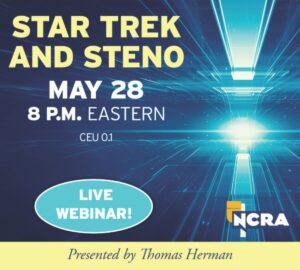By Hector Cordova
We all search a lot. After all, web searching has become an integral part of our lives. You search when you need to find an attorney’s information for a notice. You search when you need to check spellings. You search when looking for a place to grab a quick lunch when you’re in a new town. But are we really getting the most out of our web searches?
About one third of all web traffic is simply people searching on search engine websites. Although it is hard to pin down exactly how many times an average American searches the web on search engines, we can surmise from available data that you might enter 18 to 30 searches a day into your favorite search engine.
If you search the web better, you get better search results. Imagine getting the exact results you need every time you search. Your day-to-day will run smoother even outside the context of court reporting.
When we talk search engines, we basically mean Google. There’s a reason why we say “Google it” as a synonym for web searching. Google’s dominance in the web search market is huge. More than 88 percent of all searches are on Google in the United States. Globally, it’s even higher. So chances are, if you’re reading this, you search on Google if not exclusively Google.
However, if you (like me) prefer searching on an alternative search engine like Bing, Yahoo (which is powered by Bing, by the way), or DuckDuckGo, you can benefit from the search techniques outlined in this article. In case you’re wondering, Microsoft’s Bing is second to Google’s 88.34 percent search engine market share, with a paltry 5.87 percent of searches in the U. S. Yahoo is third with just 2.96 percent, with DuckDuckGo rounding out the top four with 2.38 percent.
Most of the tips in this article work with all four major search engines (Google, Bing, Yahoo, and DuckDuckGo), so let’s start with the universal search operators.
Search Basics for All Major Search Engines
AND is the default
Firstly, every time you search by default, each space between a word in your search phrase is equivalent to the AND operator.
If you search for case docket, it is the same as if you typed case AND docket in each of the major search engines.
case docket = case AND docket
videographer near me = videographer AND near AND me
If all your searches have been basic searches, simply typing phrases into the search box on your favorite search engine, you’ve been doing AND searches all along.
Quotation Marks Let You “Get Specific”
When you want to search for an exact phrase, put quotation marks around the necessary phrase in your query.
A search for case docket is case AND docket separately, but if you want “case docket,” put it in quotes, then the search engine will treat the exact phrase as necessary when searching.
Quotation marks are a great way to find information on individuals you already have the full name for. Jane Emily Smith will return a ridiculously higher number of results than “Jane Emily Smith” because the first search is Jane AND Emily AND Smith.
Note: if you’re looking for something obscure, the search engine may automatically drop one of the search words if it isn’t in quotes. The good news is that the search engine will tell you. Search engines also do this with typos, with a helpful “did you mean” prompt above your results.
Advanced Search Techniques for All Major Search Engines
You may already be familiar with the way search works with AND by default and how to use quotation marks to find more specific results, but do you know the following techniques shared by all major search engines?
Look for Specific Documents with filetype:
The filetype operator allows you to search for documents based on their specific file type. Your search results will only show the results of documents exactly matching the file type. To use the filetype command properly, it needs to be all lowercase with no space between the colon and the following filetype.
For example, JVC HC500 filetype:pdf.
In my testing, filetype: works with the following file types: html, txt, pdf, and the Microsoft Office file types (doc, docx, rtf, xls, xlsx, ppt, pptx).
I like using the filetype search operator for pdf user guides. Working as a CLVS, filetype comes in handy looking up user guides (usually pdf files) containing the exact specifications for cameras and camcorders (like if the camera stamps the time and date onto the video image). You may surprise yourself with how relevant your results can get once you filter them with filetype (especially for those pdfs).
Search a Specific Website with site:
Need to search a specific website? You can search a website for its contents easily within a search engine by using the site operator. The site: command works the same way as filetype: in that you need to enter the operator all lowercase followed by a colon with no space separating the site address with the command.
For example, CEUs site:ncra.org
This is a great way to find help or documentation for some of the websites we frequent. Recently I looked up the minimum recommended computer specifications for a piece of trial presentation software, but the recommended specifications page was hard to find. I used the site: command to find an old page inaccessible from the normal website. It was super helpful!
The Minus Sign May Reduce or Exclude Results
One of the universal-ish operators is the minus sign. The minus sign works very similarly between the major search engines, but not the same. The minus sign, or hyphen, in front of a word or phrase excludes the word or phrase from search entirely in Google and Bing and Yahoo. However, for DuckDuckGo, the – sign only reduces the number of results containing the word you want excluded.
That’s it for what the major search engines share:
- AND is your default search
- quotation marks let you search for exact phrases
- filetype: and site: let you look for certain files online
- simply search specific websites instead of the whole World Wide Web
- the minus sign in front of words or phrases allows to exclude (or, in the case of DuckDuckGo, reduce the frequency of) certain words or phrases from your searches.
The above techniques get powerful once you combine them to narrow down your results. You can become a search savant.
A Few Extra Google Goodies
There are other advanced techniques for search out there, but after what we outlined above, commands change depending on your search engine of choice. Because Google is so dominant, you Google searchers get a little bonus: A few quick tips for searching for certain things in Google.
You can search social media by placing @ in front of a word before a search. For example, place @Twitter along with the search you want, and you can search tweets without visiting the Twitter website (or app).
You can search for a price by placing $ in front of a number. Searching for exact prices can help you when looking for certain products and services at certain price points.
You can search hashtags by placing # in front of a word or phrase. Want to see when the first #NCRA2023 posted on the entire internet? Try searching for it.
Hector Cordova, CLVS, is an NCRA member and legal videographer as well as a member of the NCRA Technology Committee. Questions about technology that you would like to have the Technology Committee respond to can be directed to jcrfeedback@ncra.org.










